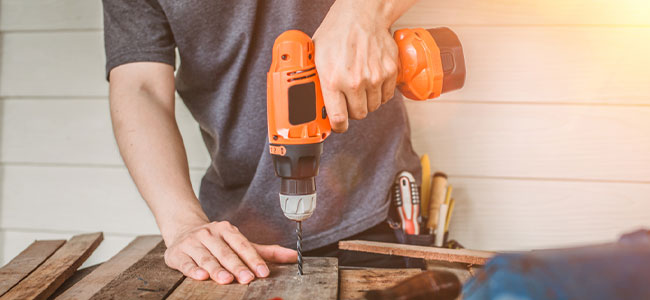
3 Safety Practices Every Tradesman Must Know About Their Power Tool Batteries
Here are three crucial things electrical contractors must know about how to safely work with their power tool batteries.
- By Susan Orenga
- Nov 14, 2023
For electrical contractors, power tools are their livelihood. Without them, the work would be impossible. However, there’s one important component of power tools that contractors might not be paying enough attention to: the batteries. Here are three crucial things electrical contractors must know about how to safely work with their power tool batteries.
- Using counterfeit batteries is dangerous.
Not only do counterfeits and knock-offs have a shorter lifespan and poorer performance than Original Equipment Manufacturer (OEM) batteries, but they also pose a risk of explosion or fire. Contractors should always purchase OEM batteries from a reputable source and avoid cheap imitations that could put worker safety at risk.
Why buy OEM? Because the consequences of doing otherwise can be very dangerous. An OEM battery is designed for seamless compatibility with the power tool and charger and has undergone rigorous testing to back it up.
Even if a contractor finds a battery online that says it works with a power tool model, they should use extreme caution when considering the purchase. The retail space is where an abundance of counterfeit and knock-off power tool batteries are sold. Scammers leverage vulnerabilities in the global supply chain, as well as tradesmen’s continuing need for new batteries, to sell a wide variety of counterfeits or unauthorized replicas. It’s gotten so bad even the FBI issued a warning about these scams.
While the exterior appearance of a counterfeit or knock-off battery may seem well-made and reassuring, what really matters is what’s on the inside. Each OEM has its own proprietary control circuitry that is not available to third-party component suppliers. No knock-off battery can match the OEM. What seems to work well out of the box may deliver dire consequences later.
Also, don’t buy on price alone. Purchasing a battery from an unknown seller without having any verification of the seller’s qualifications or experience or the battery’s construction, testing or certification, can result in an unsatisfying — and potentially dangerous — experience. Makers of these knock-offs sometimes use colors and typefaces similar to those of recognized brands specifically to confuse buyers. So pay close attention to the packaging. Purchase batteries from authorized dealers and be suspicious of any price that seems too good to be true. It probably is.
- Handle batteries safely during storage and transportation.
Lithium-ion batteries are particularly sensitive to heat and cold, so contractors should avoid leaving them in direct sunlight or freezing temperatures. Furthermore, never carry loose batteries in a pocket or bag, as they could come into contact with metal objects and short-circuit.
Start by reading the manufacturer’s instruction manual for proper care and storage of the battery. Do not strike or damage a battery (for example, do not use it as a hammer), use it solely for the defined purpose as specified by the manufacturer. If a battery has received a sharp blow, been dropped or is damaged, discontinue use.
Regularly inspect batteries for signs of damage, such as crushing, cuts or punctures. Be mindful of abnormal battery behavior, such as failure to fully charge or hold a charge, longer-than-usual charging times, noticeable drop in performance, liquid leakage from the battery or melted plastic anywhere on the pack. These are indications of an internal problem.
Never modify, disassemble or tamper with the battery because the performance can become unpredictable and dangerous. As a general practice, it is best to unplug battery chargers and remove battery packs from them when not in use.
- Recycle power tool batteries properly.
These batteries contain hazardous chemicals that can harm the environment if not disposed of correctly. Many hardware stores and battery manufacturers offer recycling programs. So contractors should take advantage of them rather than throwing batteries in the trash.
Lithium-ion batteries have revolutionized power tools and other devices, providing long-lasting, reliable power that has higher energy density, charges quickly and holds its charge longer. But, like all batteries, eventually even lithium-ion batteries reach the end of their service life.
When this happens, the first impulse might be to toss it in the trash. Don’t. These batteries must be disposed of properly by a qualified recycler.
Once improperly disposing of the battery, it may be subject to corrosion, punctures, crushing or suffer other damage during the transport and processing of household trash that could lead to a battery fire, one that is difficult by its nature to extinguish.
Federal law even requires lithium-ion batteries (and others) to be recycled, not thrown away. Such a violation carries heavy fines. In addition, 29 states have their own battery recycling laws. (To see how your state handles battery disposal, visit Call2Recycle.org. Keep in mind, states without their own laws are still governed by the federal recycling law.
Recycling your lithium-ion battery isn’t as hard as you might think. Most big-box hardware retailers have recycling bins specially designated for lithium-ion batteries. The bins are often positioned right by the entrance for maximum convenience. Simply place the battery in the bin, and the recycler does the rest. (Remember, do NOT place batteries in a recycling bin not designated for lithium-ion batteries).
For other recycling options, call the local solid waste district to find out if the community has a collection program.
In conclusion, taking care of power tool batteries is just as important as using the right tools for the job. By following these three tips, contractors can ensure that batteries are safe, reliable and long-lasting, which will help make work more efficient and effective.